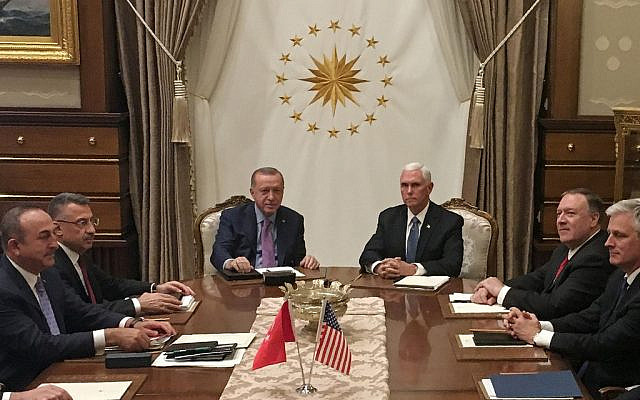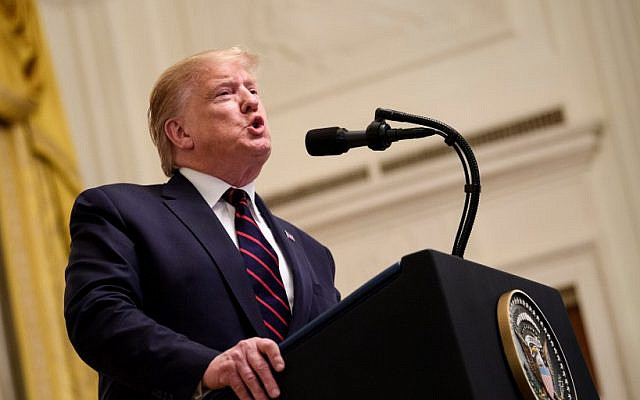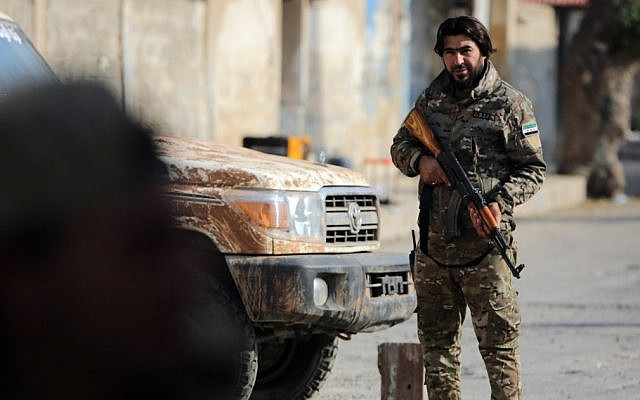Deal, which will see US remove sanctions from Ankara, appears to give Erdogan all he sought to achieve with offensive

The US, Turkey and Kurdish forces agreed Thursday to a five-day cease-fire in the Turks’ attacks on Kurdish fighters in northern Syria to allow the Kurds to withdraw to roughly 20 miles away from the Turkish border. The arrangement appeared to be a significant embrace of Turkey’s position in the weeklong conflict.
After more than four hours of negotiations with Turkish President Recep Tayyip Erdogan, US Vice President Mike Pence said the purpose of his high-level mission was to end the bloodshed caused by Turkey’s invasion of Syria, and remained silent on whether the agreement amounted to another abandonment of the US’s former Kurdish allies in the fight against the Islamic State.
Turkish troops and Turkish-backed Syrian fighters launched their offensive against Kurdish forces in northern Syria a week ago, two days after US President Donald Trump suddenly announced he was withdrawing American forces from the area.
Pence and US Secretary of State Mile Pompeo lauded Thursday’s deal as a significant achievement, and Trump tweeted that it was “a great day for civilization.” But the agreement essentially gives the Turks what they had sought to achieve with their military operation in the first place. After the Kurdish forces are cleared from the safe zone, Turkey has committed to a permanent ceasefire but is under no obligation to withdraw its troops.

In addition, the deal gives Turkey relief from sanctions the administration had imposed and threatened to impose since the invasion began, meaning there will be no penalty for the operation.
During the five-day ceasefire, the United States “will not be implementing additional sanctions,” Pence told reporters.
“Once we have a permanent ceasefire, following the orderly withdrawal of all YPG forces, the United States also agreed to withdraw the sanctions that were imposed on several cabinet officials and several agencies,” Pence said, referring to Kurdish forces in Syria.
Trump was ebullient after the agreement was announced, tweeting that “Millions of lives will be saved!” and asserting that “People have been trying to make this ‘Deal’ for many years.”
This is a great day for civilization. I am proud of the United States for sticking by me in following a necessary, but somewhat unconventional, path. People have been trying to make this “Deal” for many years. Millions of lives will be saved. Congratulations to ALL!
— Donald J. Trump (@realDonaldTrump) Oktubre 17, 2019
Speaking to reporters, Turkish Foreign Minister Mevlut Cavusoglu confirmed suspension of the offensive, but rejected the notion that the agreement constituted a ceasefire.
“We are suspending the operation, not halting it,” he said. “We will halt the operation only after [Kurdish militants] completely withdraw from the region.”
“This is not a ceasefire. A ceasefire is reached between the two legitimate parties,” he said.
The Kurdish-led Syrian Democratic Forces said they are willing to abide by the ceasefire announced by Washington and Turkey.
“We are ready to abide by the ceasefire,” covering the area from Ras al-Ain to Tal Abyad, SDF chief Mazlum Abdi told a Kurdish TV station.
Ankara has long argued that the Kurdish fighters are nothing more than an extension of the Kurdistan Workers’ Party, or PKK, which has waged a guerrilla campaign inside Turkey since the 1980s and which Turkey, as well as the US and European Union, designate as a terrorist organization.
Trump’s withdrawal of US troops has been widely condemned, including by Republican officials not directly associated with his administration. Republicans and Democrats in the House, bitterly divided over the Trump impeachment inquiry, banded together Wednesday for an overwhelming 354-60 denunciation of the US troop withdrawal.

Trump has denied that his action provided a “green light” for Turkey to move against the longtime US battlefield partners, or that he was opening the way for a revival of the Islamic State group and raising worldwide doubts about US faithfulness to its allies.
The White House released a letter on Wednesday in which Trump warned Erdogan that the sanctions could destroy his economy and that the world “will look upon you forever as the devil if good things don’t happen. Don’t be a tough guy. Don’t be a fool!”
On Wednesday, Trump also spoke dismissively of the crisis, declaring the US has no stake in defending Kurdish fighters who died by the thousands as America’s partners against Islamic State extremists. In fact, he suggested the Kurdish group might be a greater terror threat than IS, and he welcomed the efforts of Russia and the Syrian government to fill the void left after he ordered the removal of nearly all US troops from Syria.
“Syria may have some help with Russia, and that’s fine,” Trump said. “They’ve got a lot of sand over there. So, there’s a lot of sand that they can play with.”
“Let them fight their own wars,” he said.
While Erdogan heard global condemnation for his invasion, he also faced renewed nationalistic fervor at home, and any pathway to de-escalation likely needed to avoid embarrassing him domestically.
Trump did place some sanctions on Turkey for the offensive. But as Pence flew to Turkey, the president undercut his delegation’s negotiating stance, saying the US had no business in the region — and not to worry about the Kurdish fighters.
“If Turkey goes onto Syria, that’s between Turkey and Syria, it’s not between Turkey and the United States,” Trump said.
Even Republicans bristled at his action.
It was the worst decision of his presidency, said Senator Lindsey Graham of South Carolina, who meets often with the president and is one of his strongest and most important supporters in Congress.
“To those who think the Mideast doesn’t matter to America, remember 9/11 — we had that same attitude on 9/10/2001,” Graham said.
As reported by The Times of Israel
